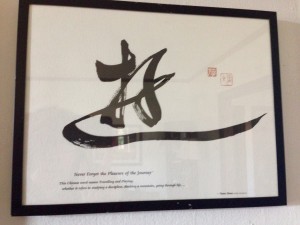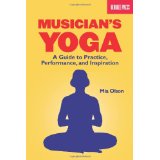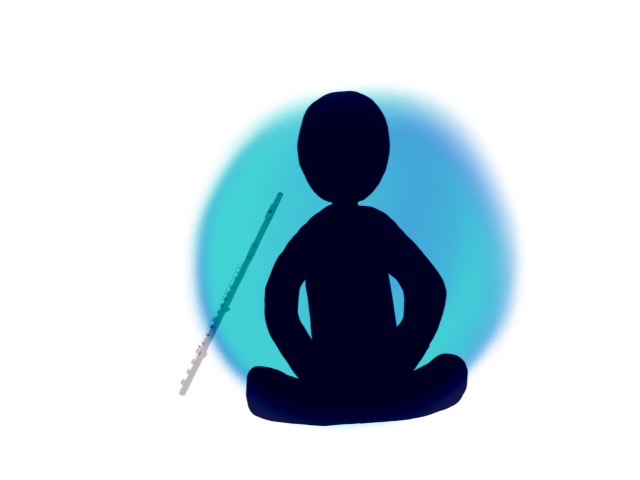Practice: The journey is the destination.
- Marlene
- Blog, flute, Uncategorized
- 2 Comments
Practice: The journey is the destination.
Practice leads to harmony.
This picture hangs beside the door to my music studio. No one can leave without seeing it, including me. The text reads
“Never Forget the Pleasure of the Journey. This Chinese word means Traveling and Playing, whether it refers to studying a discipline, climbing a mountain, going through life…”
A friend recently posted on Facebook an article titled “We are graduating too many, too narrowly trained musicians.” The author, and the book he reviews, are concerned that there are more musicians than there are jobs. Music schools are graduating a record number of highly-skilled musicians, yet there are fewer and fewer jobs available in orchestras. While this is true, I don’t see it as a crisis. Anyone who makes it through music school will possess abilities that are highly in demand in the workforce: the ability to collaborate with others, the ability to set goals and complete them, the understanding that criticism can lead to transformation, persistence and patience, among others. The resourceful music graduate will either create a job in music (perhaps where none has existed before as an entrepreneur) or will market their unique skill set to their advantage. These are not people who give up easily. They know how to spend hours alone doing hard work. Musicians know how to practice.
After completing my bachelor’s degree in flute performance at The Ohio State University, I continued my studies at the University of Colorado and completed a Master of Music degree in Flute Performance. Throughout my college years, I was aware that I didn’t want to be in the flute section of a major symphony orchestra. So why on earth would I spend thousands of dollars to get a degree that I would not use to the letter? Because I wanted to be the best I could be. I knew that if I wanted to teach, I had to immerse myself in the material. I had to learn everything I could before passing that knowledge on to others. Learning how to practice, studying, seeking out teachers, facing my performance anxiety… these were the goals.
Giving a child music lessons does not mean that the child will grow up to be a classical solo artist. Speaking as a parent, my children take lessons and practice everyday because the skills they learn will help them for the rest of their lives. I’ve been collecting articles about research on the brains of musicians. You can read about some of these studies elsewhere on the blog (Brain Imaging, Better Brains) so it seems there is compelling evidence from science that musicians have different skills than non-musicians.
I teach many adult students in my music studio. Most of them will never play professionally. They play because they love music, they love learning.
Recently, I read the book Musician’s Yoga: A Guide To Practice, Performance, and Inspiration by Mia Olson. This excellent book draws beautiful connections between the breath and body work of yoga and music practice. Even in yoga, the word practice is used to describe the time we spend on the mat. When I first started going to yoga classes, I was goal focused. I had the idea that I was going to be able to touch my toes within a month. I’ve never, ever been able to touch my toes and after four years of regular practice, I still can’t. I know that I won’t ever become a yoga teacher or a master yogi, and I’m OK with that. Some poses are easier for me than others. I show up for class with my mat and I breathe. Most days I flow with the instructor and I leave the gym feeling refreshed. Other days, I struggle against my body and I want to give up halfway through class. But I’m learning to turn off the judgement and just be glad that I showed up, that I practiced. I don’t think I’ll ever be able to touch my toes, but I can now reach my shins– progress!
Six wisdoms from practicing yoga:
- Humility- there is always going to be someone better/more flexible/stronger than me.
- Whatever is on my mind, it can wait until I am done with my practice. I turn off my cell phone, try to quiet the monkey-brain. Everything will still be there in an hour.
- Breathe deeply and consciously.
- Be playful and have a sense of humor. It’s not unusual for me to fall over during balance poses. A little laughter goes a long way toward healing a bruised ego.
- Today my practice will be different than yesterday; tomorrow will be different from today.
- Pay attention to my body. It’s good to find the edges of my ability but I always have to be careful not to injure myself.
I wonder what would happen if we re-framed music practice in a similar way. How would we feel if the goal was the practice and not the performance? What if the action of showing up in front of the music stand every day is the highest achievement? Don’t forget to breathe. Namaste.



2 comments